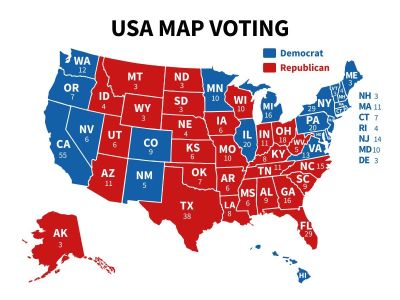Is the Electoral College 'un-American?'

Last week, Joy Behar of “The View” on ABC called the Electoral College “un-American.”
Oh my. Perhaps we could call her an “Electoral College dropout”?
The Constitution says that “We the people” are in charge of our country, but we act through our elected representatives. The provision for the Electoral College can be found in the Constitution in Article II, Section 1, Clause 2. It’s in America’s foundational document — despite Joy Behar’s claim that it’s “un-American.” The gist of it is that we don’t directly elect the president, but we do vote for those who do so. The Constitution provides a layer of protection — to spare us from would-be dictators.
I once produced a short video segment for Providence Forum called, “A Republic, Not a Democracy.” It includes comments on the Electoral College.
In that video, the late Dr. Walter Williams, who had been a long-time professor at George Mason University, noted: “The founders of our country did not intend for us to be a democracy or a majority rule, because the founders held democracy in utter contempt. They feared the idea of majority rule.”
So, said Dr. Williams, they came up with “the Electoral College as a way of electing the president, because if we did not have an Electoral College, then big states — highly populated states like California and New York and Florida — would decide who’s the president. Very few presidential candidates would campaign in Wyoming or Idaho, because the population is very small. They would put all their resources in the heavily populated states, and the founders were trying to, in their brilliance, they were trying to prevent that.”
We seem to forget these days that the states created the federal government, and not the other way around. The Electoral College is a way to let the little states have a say, as well as the big states. Because candidates have to win not just the majority vote, but the majority of the Electoral College votes, they cannot simply focus their presidential campaigns on population centers like New York, Chicago, and Los Angeles. They must also appeal to voters in less populous states to amass those electoral votes. If there were no Electoral College, states like Idaho, West Virginia, and either of the Dakotas might never be visited by a presidential candidate again.
For our video, I also interviewed Dennis Prager of PragerU, and he put it this way: “The Electoral College was a brilliant innovation of the founders, because they didn’t want a democracy, they wanted a republic.”
He noted, “The founders, being wise, understood people are not basically good. You can’t be wise if you think human nature is good. So, they understood they have to have as many checks and balances on human power as possible. That is why we have three branches of the government to be a check on one another. They didn’t trust human beings, and correctly so.”
And all of this bears directly on the Electoral College issue, notes Prager: “So, they understood that a simple direct election could easily end up with some demagogue getting a majority of the popular vote. So, there’s a check on the popular vote by the states, and that’s why they have the Electoral College. The popular vote is important, but it is not the only decisive thing. It was genius. If we get rid of the Electoral College, it’s the beginning of the end of America as it has been constituted.”
Speaking of Prager, one of the popular PragerU videos featured Constitutional scholar Tara Ross on this very issue. She is the author of The Indispensable Electoral College: How the Founders’ Plan Saves Our Country from Mob Rule and Enlightened Democracy: The Case for the Electoral College.
Having interviewed her on the radio before, I asked her for any comment to the idea of the Electoral College as supposedly being “un-American.”
She told me:
“The Electoral College is directly established by our Constitution and reflects the most basic principles of America’s founding charter. If the Electoral College is ‘un-American,’ then so is every other constitutional institution. Our Constitution creates a government that is a blend of democracy (self-governance), republicanism (deliberation & compromise), and federalism (national vs. state authority) because our Founders sought to ensure that the American government reflects all voices, despite our diversity and despite the varying sizes of our states.”
And Ross added, “The Electoral College is a reflection of these principles and simply ensures that large states and urban areas don’t tyrannize the rest of the country when it comes to selection of the President. Calling the Electoral College ‘un-American’ is nonsensical. If anything, the Electoral College is uniquely American.”
It would seem to me that people like Joy Behar have the opportunity to voice their opinions, no matter how seemingly inane, precisely because of the governmental structure the founders of America so cleverly laid for us as one nation under God.
Jerry Newcombe, D.Min., is the executive director of the Providence Forum, an outreach of D. James Kennedy Ministries, where Jerry also serves as senior producer and an on-air host. He has written/co-written 33 books, including George Washington’s Sacred Fire (with Providence Forum founder Peter Lillback, Ph.D.) and What If Jesus Had Never Been Born? (with D. James Kennedy, Ph.D.). www.djkm.org? @newcombejerry www.jerrynewcombe.com




















